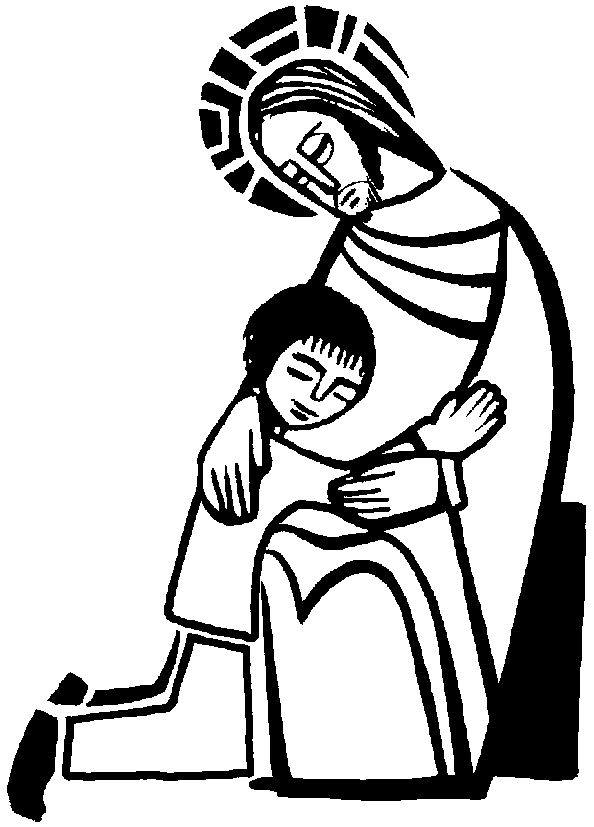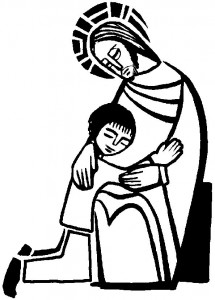Following is a jointly-authored post from Jana Bennett and David Cloutier:
Watching the Synod from the sidelines, it is evident that Catholic tradition is trying to steer between two extremes. Each of these extremes are caricatures currently being used in the Synod debates, at least as the standard reporting has it. The one caricature is the person who understands the Catholic moral tradition to involve absolute moral certainty and rigidity. The other caricature is the person who so prioritizes individual conscience that centuries of tradition can fall in the face of one individual’s conscience.
At issue is how we might make sense of at least four central concerns. 1) Our belief in God, who is the Good and the True; 2) our long-standing tradition, through which we are constantly seeking God ; 3) the often-called “primacy of individual conscience” – the fact that individual Christians do indeed encounter everyday situations where living out what the Church teaches about marriage seems impossible for a variety of reasons – including the presence of violence and abuse; 4) our call from Christ himself to make disciples of all nations.
Convictions #1 and #2 seem to favor those who are resisting any significant change in the Church’s practice, whereas convictions #3 and #4 seem to animate those who believe that changes are needed.
We accept the validity of all these concerns. The question at hand is whether and how appeals to conscience, especially in relation to authoritative teaching, are helpful in addressing some of the key contested points of the Synod’s debate.
On Conscience…
They seem so, because conscience appears to allow for individual variation in judgment about concrete situations, even while retaining the basic principles of the Church’s teachings. Paragraphs 53-59 of the International Theological Commission’s document on the natural law deal partly with these concerns – and have become important in the Synod discussions. In the conclusion of those paragraphs, we find:
…moral science cannot furnish an acting subject with a norm to be applied adequately and almost automatically to concrete situations; only the conscience of the subject, the judgement of his practical reason, can formulate the immediate norm of action. But at the same time, this approach does not abandon conscience to mere subjectivity; it aims at having the subject acquire the intellectual and affective dispositions which allow him to be open to moral truth, so that his judgment may be adequate. Natural law could not, therefore, be presented as an already established set of rules that impose themselves a priori on the moral subject; rather, it is a source of objective inspiration for the deeply personal process of making a decision.
The ITC’s document itself raises the question: how can an ability to make decisions with the flexibility appropriate to the vast array of concrete situations go hand in hand with moral truth? In a comment on the ITC’s document, Archbishop Cupich emphasized the “inviolable conscience” as the recognition of another person as a real, thinking moral agent – an adult, and not a child.
Conscience is important, but tricky. Its inviolability should not be confused with infallibility. Thus, an absolute respect for the primacy of conscience does not translate into an affirmation of conscience’s particular judgment. As is well known among moral theologians, Thomas Aquinas addresses the question of “whether the will is evil when it is at variance with erring reason?” (I-II.19.5) Thomas’ answer is one of the longer entries in the Summa. Here Aquinas argues that “the erring conscience binds.” (Emphasis ours.)
This is quite a serious claim. Quite remarkably, in response to the first objection to the question of whether the will is evil, Aquinas writes that “Although the judgment of an erring reason is not derived from God, yet the erring reason puts forward its judgment as being true, and consequently as being derived from God, from Whom is all truth.” This necessity of following conscience, however, does not mean that a person is acting rightly. In the very next question, Aquinas stresses that one may still be blameworthy, even when following conscience.
While some may regard Thomas’ writing as mental gymnastics, Archbishop Cupich’s remarkably moving and poignant story of a priest who insists on communion in a certain situation, an experience which leads to a powerful conversion on the part of the recipient, actually fits Aquinas’s logic well. Here we have a situation where a respect for conscience leads to a recognition of error. Anyone reading this story would be hard pressed to deny that the priest seems to have done the right thing – although it doesn’t seem as though this is a case of the woman acting on conscience, since she approached the sacrament intending not to receive!
So, while conscience is important, it’s not clear that an appeal to conscience is necessarily germane to the current discussion about individuals in so-called irregular situations. What may be more helpful is another point from the ITC document: the focus on practical reason, and in the case of Cupich’s example, practical reasoning on the part of the priest. So much of the work of producing theological documents and writing theology is theoretical reason, rather than practical reason. Theoretical reason features logic, and can be assessed in terms of truthfulness.
Finding Satisfactory Answers
Practical reason doesn’t work with the same rules of logic, however, because the aim of practical reasoning is an action. If it is raining and I am walking, my practical reasoning might be (borrowing here from Brad Kallenberg’s book Ethics by Design, chapter 5):
Premise 1: I need shelter. Premise 2: There is a cave. Action: I make my way to the cave.
If we attempted to put this in terms of logic, it might look like this:
“What is needed is shelter. If something is a cave, it is shelter. Therefore, what is needed is a cave.”
In logical terms, this is the fallacy of affirming the consequent. As Kallenberg notes, we discover that practical reasoning can’t be evaluated in term of its relation to truth as understood in connection to logical arguments. Rather, we evaluate practical reasoning in terms of “satisfactoriness.” If I’m hiking in the rain and need shelter, there may be any number of possible right answers, as well as some clear wrong answers. Finding a cave might work. So might taking shelter at an abandoned house that has a roof and a porch. So much depends on specifics – how far away the house is compared to the cave, how hard it is raining, and so on.
In practical reasoning, we can assess satisfactoriness and make judgements about how helpful, right, wrong, etc. the reasoning might be. This is also the point where we can see that there are beginners in practical reasoning and also experts. A beginning hiker might not see the rundown house that is 100 feet off the trail, or might be scared to go off trail – and might then proceed to the cave that is a mile away. The more expert hiker might see that the cave isn’t the best option – and would probably know a lot more about possible answers – right and wrong.
The difficulty is that the beginning hiker can’t hope to develop that kind of expert knowledge without making a beginning at hiking. A beginning hiker won’t even necessarily know much about wrong answers, and will seek what is the best looking answer (and therefore right because it gets him or her out of the storm!)
As our doctoral adviser (Stanley Hauerwas) is fond of saying: “You can only act in a world you can see.” A beginning hiker can’t see in the same way – but that beginning hiker can learn. An expert hiker might see well, but something might obscure sight on occasion.
Of course, hiking isn’t going to be fully analogous to the questions facing the Synod regarding marriage. Still, the interplay between theoretical and practical reasoning is part of what is at issue here. People really do see situations in vastly different ways and need to be able to act according to what they think they see going on – even when, as Thomas argues, they are in error.
“We Walk to Heaven Backward”: The Role of Confession
That brings us to our next point: as we mentioned before, what we sometimes overlook is that Thomas argues in the very next question that an erring conscience does not necessarily excuse, even if it binds. The priority of conscience must go hand in hand with a constant humility about the fragility of particular judgments of one’s conscience.
We are not excused from the consequences of error. We are meant to be a continually forgiving people even as we seek to be forgiven ourselves. We are meant to help each other – from the person beginning with very little scope of vision, to the person who may be an expert but still prone to make mistakes on occasion. The prayer Jesus gives us: forgive us our trespasses as we forgive those who trespass against us, should resonate constantly throughout all the activity we do as Christians.
None of us knows for sure that our answers to the practical stuff of life fully lead us to God, even as, at the same time, we hold as true that God is our source and our salvation who has given us the Church. This is why we understand humility as a great virtue, and why the Sacrament of Reconciliation is so important to the life of the Church. So there must always be room for all of us to look back and say, “That thing I did that I thought was so right, ended up being wrong.” It is hard to give that kind of space without it either becoming coercive, or giving the appearance of being individualistic to the point that all seems relative.
Cardinal John Henry Newman describes it most poignantly:
We know what is right, not positively, but negatively;—we do not see the truth at once and make towards it, but we fall upon and try error, and find it is not the truth. We grope about by touch, not by sight, and so by a miserable experience exhaust the possible modes of acting till nought is left, but truth, remaining. Such is the process by which we succeed; we walk to heaven backward… (Cardinal John Henry Newman, Sermon 8)
Many people have been taken with the idea of walking to heaven backward. It speaks something true about the Christian’s journey – we are stumbling toward that which we can’t quite see. As Archbishop Cupich concludes his story, he offers a similar notion: “It’s not a straight line.”
This is why forgiveness – and the recovery of Reconciliation that the pope has emphasized so much – is important. We need to become a much more visibly forgiving people, who ourselves seek forgiveness.
Or, as Cardinal Wuerl said, in commenting on the Synod: “I think that’s what the tension is between those who put the greatest emphasis on simply saying it — and saying it over and over again — and those who are saying if it’s not being heard, we have to go out and begin to listen so that we know how to say this in a way it will be heard,” he said. “That’s the difference. In neither case are we changing the teaching.” “You don’t go out to meet people where they are to scold them,” he said. “You go out to bring them the truth but sometimes to be heard you have to let the person know you know their struggle if you’re going to accompany them at all.”
In short, Wuerl, Cupich, and Francis himself are offering descriptions of the kind of Church community we are called to be, not of how the Church’s teachings on marriage need to change. Given the inevitable limitations of formulating conceptual knowledge adequate to any and all situations, the realities of experience put the burden very much on rigorous pastoral care, including Christians who are “experts” on living out a life of discipleship as married people.
The idea that people want accompaniment, not condemnation, is clear – yet we should simultaneously acknowledge that the traditional work of admonishment of the sinner really does fit into genuine accompaniment. The Synod is not on the way to a real answer to this conundrum, and this is in (large?) part because a Synod can’t answer it by recourse to abstractions of any sort. The real answer can only come from laborious pastoral care, which must include Christians’ earnest desire and attention to developing their practical reasoning.
We conclude: discussions and initiatives about whether and how our parish communities are rightly constituted to provide such pastoral care is likely to get us much further that intractable debates about terms like conscience.






Thanks for this wonderful post. I’d like to amplify on your closing point. The discussion of whether our parish communities are rightly constituted to provide that pastoral care raises in my mind the changes in parish community in the US in the last century. We are not rooted in a place now as we were before, and I wonder at the impact of that for the pastoral care you describe.
My parents grew up in ethnic neighborhoods of St. Louis. Nearly all of their many siblings lived their lives within a couple hours of St. Louis. Many other families also lived in the same area for generations. In contrast, I am one of four siblings and we all live in different cities, only one still in St. Louis. The three of us not in St. Louis have all moved to different cities more than once.
Did that stability of place that my parents’ generation experienced help create a parish life that could more readily provide that care of which you write? Receiving admonition from someone I’ve known all of my life is different from receiving it from a stranger. From those close the admonition comes from a place of security, of knowing that I am loved and forgiven. From someone I don’t know there is more anxiety. Do they only know me through my error? Can I really trust their forgiveness? Those with whom I am rooted know me as a complete person. They’ve seen it all. Those in the parish to which I’ve just moved in a new city do not. I am just an abstraction, a stereotype.
Did that pastoral care come to take a particular form in the ecology in which we used to live? With the disruption of ecology caused by our mobility do we need a new pastoral care? When we are rooted, the language of accompaniment is rich and deep. There are so many ways to express accompaniment. When we move, the language seems more sparse. How can we make that language deeper, give it a greater vocabulary?
It’s encouraging that at least some of the synod discussion seems to have spoken to these issues of parish communities–how to walk with the old, the newly married, the marginalized. And the blogger Leah Libresco just wrote with some suggestions about how to draw people in, so perhaps that signals that yet others are raising this topic.
In an increasingly individualistic culture, which makes just showing up at Mass then leaving without making real contact with others, it will be unnatural to build community, but it seems also to be essential. Thanks again.